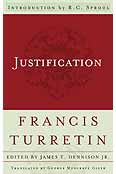
Francis Turretin
Reviewed by: Larry Wilson
Justification, by Francis Turretin. Translated by James T. Dennison, Jr. Published by P&R Publishing, 2004. Paper, 144 pages, list price $9.99. Reviewed by Pastor Larry Wilson.
Martin Luther called the doctrine of justification "the article of a standing and of a falling church." According to Francis Turretin, it "must be handled with the greater care and accuracy, as this saving doctrine is of the greatest importance in religion" (p. 1). If it is "adulterated or subverted," wrote Turretin, "it is impossible to retain purity of doctrine in other places. Hence Satan in every way endeavor[s] to corrupt this doctrine in all ages" (p. 1).
Francis Turretin (1623-1687) pastored the church of Geneva for nearly forty years and was a professor of theology. He represents the clear teaching of Protestant Scholasticism in the seventeenth century. Highly regarded for their precision, Turretin's Institutes of Elenctic Theology were used as textbooks by generations of seminarians, including those who studied at Princeton under Charles Hodge in the nineteenth century. Indeed, those who have used Hodge's Systematic Theology are well aware that it is saturated with lengthy quotes from Turretin . . . in Latin! In 1994, P&R published the Institutes as a three-volume set . . . in English! The present book, Justification, is excerpted from the Institutes and is published for the first time as a separate volume.
In this book, Turretin expounds and defends the orthodox doctrine of justification from Scripture as set over against Romanist, libertine, Arminian, and Socinian views. How fresh this discussion sounds! There really is nothing new under the sun. It's especially helpful, for the sake of understanding, to see biblical doctrine set in contrast to unbiblical distortions, as Turretin does.
Turretin makes it clear that justification is forensic; that is, it is a once-for-all judicial verdict that God declares. He shows that God cannot declare this verdict except on the ground of perfect righteousness. It is true that God infuses Christ's righteousness into us and sanctifies us, but that inherent righteousness is never perfect in this life, and therefore can never be the ground for our justification. Rather, it is the perfect righteousness of Jesus Christ imputed to the sinner which constitutes the ground for God's verdict. In other words, Jesus Christ is "of sin the double cure," cleansing us "from its guilt and power." We must never divorce these two cleansings from each other, but we must always distinguish them. Turretin does so with great clarity:
In a twofold way Christ imparts his blessings to us, by a forensic imputation, and a moral and internal infusion. The former flows from Christ as surety and is the foundation of our justification. The latter depends upon him as head, and is the principle of sanctification. For on this account, God justifies us because the righteousness of our surety, Christ, is imputed to us. And on this account we are renewed because we derive the Spirit from our head, Christ, who renews us after the image of Christ and bestows upon us inherent righteousness. (pp. 29-30, emphasis added)
God's verdict of justification includes both the full pardon of sins (past, present, and future) and the conferring of all the rights of adoption as God's children. Faith alone is the instrument through which a sinner can receive this divine verdict. God does not justify sinners because if their faith, but through their faith. And he justifies them through their faith alone.
Turretin is especially helpful in breaking down the apparent conflict between Paul and James on faith, works, and justification (pp. 96ff.). God declares his verdict of justification at the moment of effectual calling; even though he decrees it in eternity, he executes his decree in time. At that moment, he fully grants his verdict of justification. He will publicly declare that verdict on the Last Day, but we should never confuse that public declaration with justification itself (pp. 101ff.).
Justification has footnotes at the foot of the page, where they belong. It has a good Scripture index. There is no topical index, but it's not a long book, and its chapters are short and clearly ordered. There is occasional inconsistency in the way some points are delineated. For example, on pages 15 and following, point "( 1)" is followed by "second," "third," etc. Because these paragraphs contain other numbers in parentheses, this can cause some confusion. But it is not that difficult to follow the train of thought.
Throughout the book, Turretin shows clarity of thought, breadth of learning, pastoral sensitivity, and passion for the gospel. In an excellent introduction, R. C. Sproul illustrates that this book is by no means a historical relic, but rather is a highly relevant discussion of an issue that is troubling the church today. Highly recommended.
June 15, 2025
June 08, 2025
June 01, 2025
Anxiety: Finding the Better Story
May 25, 2025
April 27, 2025
The Devoted Mind: Seeking God’s Face in a World of Distraction
April 20, 2025
April 13, 2025
© 2025 The Orthodox Presbyterian Church